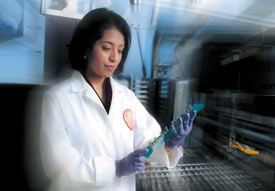The University of Texas Health Science Center at San Antonio
 The frontiers of aging research are best advanced when the leading investigators in a field are gathered in one place and focus their efforts and the latest research methodologies on a specific problem or goal. This philosophy is the cornerstone of The Sam and Ann Barshop Center for Longevity and Aging Studies (Barshop Center), one of the newest centers at The University of Texas Health Science Center at San Antonio (UTHSCSA). Construction will soon be underway for new facilities to house the Barshop Center, named for former UT System Regent Sam Barshop and his wife, Ann. The Permanent University Fund is providing six million dollars over the next two years to help fund the construction of the new building.
The frontiers of aging research are best advanced when the leading investigators in a field are gathered in one place and focus their efforts and the latest research methodologies on a specific problem or goal. This philosophy is the cornerstone of The Sam and Ann Barshop Center for Longevity and Aging Studies (Barshop Center), one of the newest centers at The University of Texas Health Science Center at San Antonio (UTHSCSA). Construction will soon be underway for new facilities to house the Barshop Center, named for former UT System Regent Sam Barshop and his wife, Ann. The Permanent University Fund is providing six million dollars over the next two years to help fund the construction of the new building.
The goal of the Barshop Center is to identify the genes and underlying biological processes that enhance healthy aging and longevity and retard/reverse the deleterious effects associated with age-related diseases. The mere mention of these diseases, including diabetes, cancer, neurodegeneration, and Alzheimer's, inflicts fear upon the population. The Barshop Center's lead investigators are scientists pursuing research programs examining the fundamental processes of aging. These programs include cellular aging, transgenic models of aging, and genetics of human aging.
James R. Smith, Ph.D., professor of pathology and holder of the Ewing Halsell Distinguished Chair in Aging Research, heads a research team seeking to understand the basic molecular mechanisms involved in human cellular aging. One of the team members, Olivia Pereira-Smith, Ph.D., already has uncovered a new gene that may be involved in cellular aging. The Cellular Aging Program's long-range goal is to understand the basic molecular mechanisms involved in human cellular senescence.
Another program, the Transgenic Models of Aging Program, will generate and study transgenic mice and rats. These animals are used for various purposes including allowing investigators to identify and understand the function of genes that retard aging and extend longevity. Specifically, Dr. James F. Nelson, professor of physiology, is studying three areas: the effects of food restriction on longevity, whether melatonin can prolong life and delay age-related pathology, and the causes of accelerated ovarian follicular depletion, which is responsible for human menopause.
Jan Vijg, Ph.D., professor of physiology, heads the Barshop Center's Genetics of Human Aging Program which focuses on understanding human aging by studying the dynamic network of genes that determine the physiology of an organism over time. His initiative is to develop new mouse models of aging. His team is developing mice with genetic makeup nearly identical to profiled humans. The purpose is to study both the effects of mutations and the effects of gene replacement and therapy.
"The San Antonio aging research community is enormously expanding right now. Within a few years, the Barshop Center will be the number one center for aging research in the country and in the world," according to Dr. Vijg.
The Barshop Center, under the direction of Arlan G. Richardson, Ph.D., truly has gathered in one place the leading investigators in aging research and, soon to follow, the state of the art facilities to support those investigators. Along with the PUF's six million funding of the Barshop Center, previous PUF allocations helped purchase equipment for the Barshop Center.